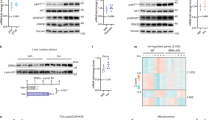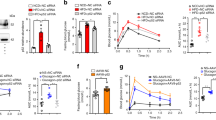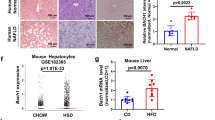Abstract
Type 2 diabetes mellitus, a disease with significant effects on the health and economy of Western societies, involves disturbances in both lipid and carbohydrate metabolism1,2,3. In the insulin-resistant or diabetic state, the liver is unresponsive to the actions of insulin with regard to the suppression of glucose output but continues to produce large amounts of lipid, the latter mimicking the fed, insulin-replete condition4,5. The disordered distribution of lipids contributes to the cardiovascular disease that is the greatest cause of mortality of type 2 diabetes mellitus6,7. Yet the precise signal transduction pathways by which insulin regulates hepatic lipid synthesis and degradation remain largely unknown. Here we describe a mechanism by which insulin, through the intermediary protein kinase Akt2/protein kinase B (PKB)-β, elicits the phosphorylation and inhibition of the transcriptional coactivator peroxisome proliferator-activated receptor-coactivator 1α (PGC-1α), a global regulator of hepatic metabolism during fasting. Phosphorylation prevents the recruitment of PGC-1α to the cognate promoters, impairing its ability to promote gluconeogenesis and fatty acid oxidation. These results define a mechanism by which insulin controls lipid catabolism in the liver and suggest a novel site for therapy in type 2 diabetes mellitus.
This is a preview of subscription content, access via your institution
Access options
Subscribe to this journal
Receive 51 print issues and online access
$199.00 per year
only $3.90 per issue
Buy this article
- Purchase on Springer Link
- Instant access to full article PDF
Prices may be subject to local taxes which are calculated during checkout




Similar content being viewed by others
References
Bouche, C., Serdy, S., Kahn, C. R. & Goldfine, A. B. The cellular fate of glucose and its relevance in type 2 diabetes. Endocr. Rev. 25, 807–830 (2004)
McGarry, J. D. Banting Lecture 2001: Dysregulation of fatty acid metabolism in the etiology of type 2 diabetes. Diabetes 51, 7–18 (2002)
Zimmet, P., Alberti, K. G. & Shaw, J. Global and societal implications of the diabetes epidemic. Nature 414, 782–787 (2001)
Diraison, F., Moulin, P. & Beylot, M. Contribution of hepatic de novo lipogenesis and reesterification of plasma non esterified fatty acids to plasma triglyceride synthesis during non-alcoholic fatty liver disease. Diabetes Metab. 29, 478–485 (2003)
Donnelly, K. L. et al. Sources of fatty acids stored in liver and secreted via lipoproteins in patients with nonalcoholic fatty liver disease. J. Clin. Invest. 115, 1343–1351 (2005)
Van Gaal, L. F., Mertens, I. L. & De Block, C. E. Mechanisms linking obesity with cardiovascular disease. Nature 444, 875–880 (2006)
Eckel, R. H., Kahn, R., Robertson, R. M. & Rizza, R. A. Preventing cardiovascular disease and diabetes: a call to action from the American Diabetes Association and the American Heart Association. Circulation 113, 2943–2946 (2006)
Lin, J., Handschin, C. & Spiegelman, B. M. Metabolic control through the PGC-1 family of transcription coactivators. Cell Metab. 1, 361–370 (2005)
Puigserver, P. et al. Insulin-regulated hepatic gluconeogenesis through FOXO1–PGC-1α interaction. Nature 423, 550–555 (2003)
Barthel, A., Schmoll, D. & Unterman, T. G. FoxO proteins in insulin action and metabolism. Trends Endocrinol. Metab. 16, 183–189 (2005)
Liao, J., Barthel, A., Nakatani, K. & Roth, R. A. Activation of protein kinase B/Akt is sufficient to repress the glucocorticoid and cAMP induction of phosphoenolpyruvate carboxykinase gene. J. Biol. Chem. 273, 27320–27324 (1998)
Cho, H. et al. Insulin resistance and a diabetes mellitus-like syndrome in mice lacking the protein kinase Akt2 (PKB β). Science 292, 1728–1731 (2001)
Kohn, A. D., Summers, S. A., Birnbaum, M. J. & Roth, R. A. Expression of a constitutively active Akt Ser/Thr kinase in 3T3-L1 adipocytes stimulates glucose uptake and glucose transporter 4 translocation. J. Biol. Chem. 271, 31372–31378 (1996)
Ueki, K. et al. Potential role of protein kinase B in insulin-induced glucose transport, glycogen synthesis, and protein synthesis. J. Biol. Chem. 273, 5315–5322 (1998)
Brazil, D. P., Yang, Z. Z. & Hemmings, B. A. Advances in protein kinase B signalling: AKTion on multiple fronts. Trends Biochem. Sci. 29, 233–242 (2004)
Barthel, A. & Schmoll, D. Novel concepts in insulin regulation of hepatic gluconeogenesis. Am. J. Physiol. Endocrinol. Metab. 285, E685–E692 (2003)
Nakae, J., Kitamura, T., Silver, D. L. & Accili, D. The forkhead transcription factor Foxo1 (Fkhr) confers insulin sensitivity onto glucose-6-phosphatase expression. J. Clin. Invest. 108, 1359–1367 (2001)
Kanaya, E., Shiraki, T. & Jingami, H. The nuclear bile acid receptor FXR is activated by PGC-1α in a ligand-dependent manner. Biochem. J. 382, 913–921 (2004)
Schreiber, S. N., Knutti, D., Brogli, K., Uhlmann, T. & Kralli, A. The transcriptional coactivator PGC-1 regulates the expression and activity of the orphan nuclear receptor estrogen-related receptor α (ERRα). J. Biol. Chem. 278, 9013–9018 (2003)
Huss, J. M., Kopp, R. P. & Kelly, D. P. Peroxisome proliferator-activated receptor coactivator-1α (PGC-1α) coactivates the cardiac-enriched nuclear receptors estrogen-related receptor-α and -γ. Identification of novel leucine-rich interaction motif within PGC-1α. J. Biol. Chem. 277, 40265–40274 (2002)
Pilegaard, H., Saltin, B. & Neufer, P. D. Exercise induces transient transcriptional activation of the PGC-1α gene in human skeletal muscle. J. Physiol. (Lond.) 546, 851–858 (2003)
Puigserver, P. & Spiegelman, B. M. Peroxisome proliferator-activated receptor-γ coactivator 1 α (PGC-1 α): transcriptional coactivator and metabolic regulator. Endocr. Rev. 24, 78–90 (2003)
Yoon, J. C. et al. Control of hepatic gluconeogenesis through the transcriptional coactivator PGC-1. Nature 413, 131–138 (2001)
Obata, T. et al. Peptide and protein library screening defines optimal substrate motifs for AKT/PKB. J. Biol. Chem. 275, 36108–36115 (2000)
Ono, H. et al. Hepatic Akt activation induces marked hypoglycemia, hepatomegaly, and hypertriglyceridemia with sterol regulatory element binding protein involvement. Diabetes 52, 2905–2913 (2003)
Schilling, M. M., Oeser, J. K., Boustead, J. N., Flemming, B. P. & O'Brien, R. M. Gluconeogenesis: re-evaluating the FOXO1–PGC-1α connection. Nature 443, E10–E11 (2006)
Li, X., Yost, H. J., Virshup, D. M. & Seeling, J. M. Protein phosphatase 2A and its B56 regulatory subunit inhibit Wnt signaling in Xenopus. EMBO J. 20, 4122–4131 (2001)
Finck, B. N. et al. Lipin 1 is an inducible amplifier of the hepatic PGC-1α/PPARα regulatory pathway. Cell Metab. 4, 199–210 (2006)
Wolfrum, C., Besser, D., Luca, E. & Stoffel, M. Insulin regulates the activity of forkhead transcription factor Hnf-3β/Foxa-2 by Akt-mediated phosphorylation and nuclear/cytosolic localization. Proc. Natl Acad. Sci. USA 100, 11624–11629 (2003)
Acknowledgements
We thank Q. Chu for her help with the animal experiments, and P. Puigserver, M. Accili and B. Finck for providing reagents and advice. This work was supported by NIH grants to M.J.B. and X.L.
Author Contributions X.L. performed all the experiments, which were designed by X.L. and M.J.B. B.M. assisted in experiments with animals, and Q.G. generated the phospho-specific antiserum. The paper was written by X.L. and M.J.B.
Author information
Authors and Affiliations
Corresponding author
Ethics declarations
Competing interests
Reprints and permissions information is available at www.nature.com/reprints. The authors declare no competing financial interests.
Supplementary information
Supplementary Information
This file contains Supplementary Figures S1-S4 with Legends and Supplementary Table S1. (PDF 761 kb)
Rights and permissions
About this article
Cite this article
Li, X., Monks, B., Ge, Q. et al. Akt/PKB regulates hepatic metabolism by directly inhibiting PGC-1α transcription coactivator. Nature 447, 1012–1016 (2007). https://doi.org/10.1038/nature05861
Received:
Accepted:
Published:
Issue Date:
DOI: https://doi.org/10.1038/nature05861
This article is cited by
-
Peroxisome proliferator-activated receptor gamma coactivator-1 (PGC-1) family in physiological and pathophysiological process and diseases
Signal Transduction and Targeted Therapy (2024)
-
Anoikis resistance and immune escape mediated by Epstein-Barr virus-encoded latent membrane protein 1-induced stabilization of PGC-1α promotes invasion and metastasis of nasopharyngeal carcinoma
Journal of Experimental & Clinical Cancer Research (2023)
-
Mitochondria dysfunction in CD8+ T cells as an important contributing factor for cancer development and a potential target for cancer treatment: a review
Journal of Experimental & Clinical Cancer Research (2022)
-
MiR-146a-5p, targeting ErbB4, promotes 3T3-L1 preadipocyte differentiation through the ERK1/2/PPAR-γ signaling pathway
Lipids in Health and Disease (2022)
-
A comprehensive review on phytochemicals for fatty liver: are they potential adjuvants?
Journal of Molecular Medicine (2022)
Comments
By submitting a comment you agree to abide by our Terms and Community Guidelines. If you find something abusive or that does not comply with our terms or guidelines please flag it as inappropriate.



